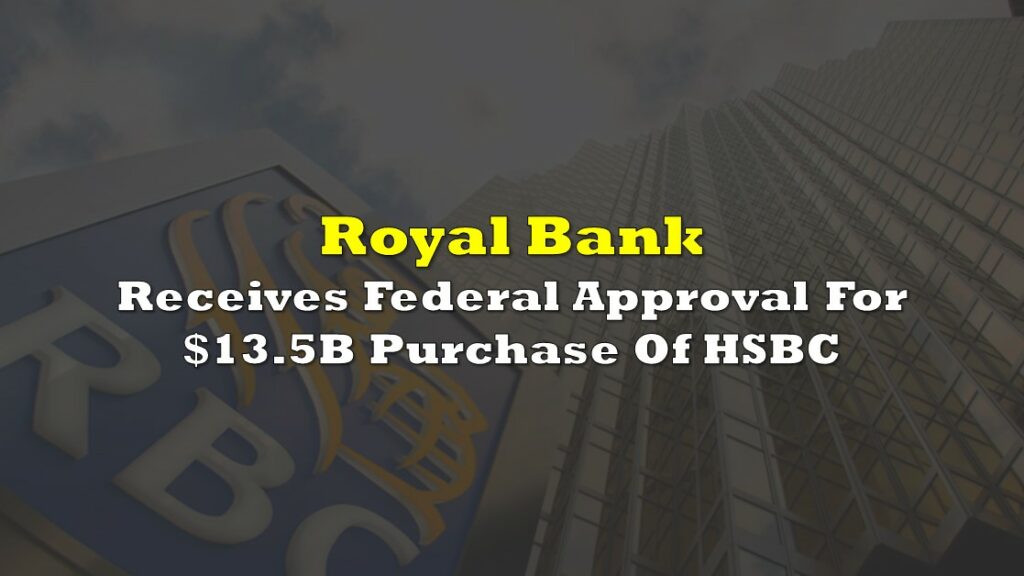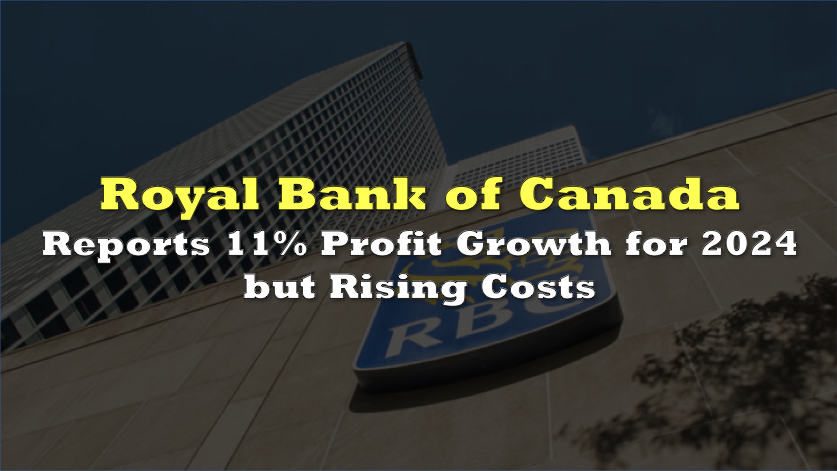The Royal Bank of Canada (TSX: RY) delivered a robust financial performance in the third quarter of its fiscal year 2024, surpassing analysts’ expectations. This quarter marked RBC’s first full reporting period since the completion of its $13.5 billion acquisition of HSBC’s Canadian operations, a strategic move that significantly bolstered the bank’s financials.
RBC reported net income of $4.49 billion for the quarter ended July 31, 2024, a 16% increase from $3.86 billion in the same period last year. This strong earnings growth translated into diluted earnings per share (EPS) of $3.09, up from $2.73 in the third quarter of 2023, representing a 13% year-over-year increase.
On an adjusted basis, which excludes one-time items such as acquisition-related costs, RBC’s net income rose by 18% year-over-year to $4.73 billion, compared to $4.0 billion in Q3 2023. Adjusted diluted EPS also increased to $3.26 from $2.83 in the same quarter last year, marking 15% growth and exceeding the average analyst estimate of $2.95.
RBC’s total revenue for the quarter amounted to $14.63 billion, a 13% increase compared to $12.98 billion in Q3 2023. This revenue growth was largely driven by the inclusion of HSBC Canada, which contributed to a rise in net interest income and fee-based revenues across the bank’s core segments.
READ: HSBC Completes $10B Sale of Canadian Unit to Royal Bank of Canada
The Personal & Commercial Banking segment saw its net income rose by 17% to $2.49 billion, up from $2.13 billion in Q3 2023, with the acquisition of HSBC Canada added $198 million to this segment’s earnings. Even excluding the HSBC results, the segment demonstrated organic growth, with net income increasing by 7% year-over-year.
The growth in this segment was driven by higher net interest income, which rose due to higher spreads and solid average volume growth in Canadian banking. RBC’s focus on expanding its domestic footprint, particularly through the HSBC acquisition, has paid off, with the bank absorbing 780,000 new clients and a $71 billion loan book from HSBC Canada.
In contrast, the bank’s smaller insurance and corporate support divisions saw declines in earnings. The insurance segment faced higher claims and lower premium growth, leading to a dip in income.
READ: Bank of Montreal Q3 2024 Financials: Estimates Missed Due To Higher Credit-Loss Provisions
RBC’s Capital Markets division also reported impressive growth, with net income increasing by 23% year-over-year to $1.17 billion, up from $950 million in Q3 2023. This was driven by a resurgence in deal-making activities as corporate executives, encouraged by a more stable economic outlook, pursued acquisitions and raised capital through stock and bond issuances. The division also benefited from increased trading volumes and advisory fees.
The Wealth Management segment also performed well, with higher fee-based revenues reflecting positive market conditions and strong net sales. This segment’s net income rose to $1.34 billion in Q3 2024, up from $1.14 billion in Q3 2023, a 17% increase.
For the third quarter of 2024, RBC declared a quarterly dividend of $1.35 per share, which is consistent with the previous quarter’s dividend, and a 6% increase from the $1.27 per share paid in the third quarter of 2023.
Provisions for credit losses and HSBC acquisition
One of the key highlights of RBC’s third-quarter results was its lower-than-expected provisions for credit losses (PCL). RBC set aside $659 million as PCL in Q3 2024, compared to $616 million in Q3 2023. While this represents a year-over-year increase of 7%, it was significantly lower than the $903 million that analysts had forecasted.
The provision was also down from $920 million in the previous quarter, reflecting improved credit conditions and effective risk management.
The year-over-year increase in PCL was driven by higher provisions in personal and commercial banking, particularly due to elevated credit risk in Canadian banking portfolios. However, the bank’s cautious approach and robust capital position, with a Common Equity Tier 1 (CET1) ratio of 13%, provided a solid buffer against potential credit losses.
READ: Scotiabank Q3 2024: Credit-Loss Provisions and Market Realities Shape Earnings Drop
“Our Q3 results demonstrate that RBC continues to operate from a position of strategic and financial strength with solid revenue growth,” said CEO Dave McKay. “Combined with our recently announced changes to the executive leadership team and business segments, RBC is better positioned than ever to accelerate our next phase of growth and deliver long-term value to clients, communities, and shareholders.”
On the other hand, while the HSBC acquisition has significantly boosted RBC’s earnings, it also came with substantial costs. RBC reported $160 million in transaction and integration costs related to the acquisition in Q3 2024, up from $110 million in Q3 2023.
Additionally, the bank incurred $154 million in amortization of acquisition-related intangibles, compared to $81 million a year earlier.
These costs, while significant, are expected to taper off as the integration process progresses. RBC has already made substantial strides in absorbing HSBC Canada’s operations, including the migration of customers and integration of systems.
Looking forward, RBC is undergoing a significant internal restructuring to align its operations with its growth ambitions. Effective September 1, 2024, the bank will split its Canadian business into two distinct segments: personal banking and commercial banking. This move is designed to provide more focused leadership and allow for greater specialization within each segment.
Erica Nielsen, who has been with RBC for over two decades, will lead the personal banking unit, while Sean Amato-Gauci, who has a strong background in commercial banking, will take charge of the commercial division. Neil McLaughlin, previously head of the combined banking division, will transition to head the wealth management division.
RBC last traded at $156.57 on the TSX.
Information for this briefing was found via Sedar, Reuters, Financial Post, Bloomberg, MarketWatch, and the sources mentioned. The author has no securities or affiliations related to this organization. Not a recommendation to buy or sell. Always do additional research and consult a professional before purchasing a security. The author holds no licenses.









